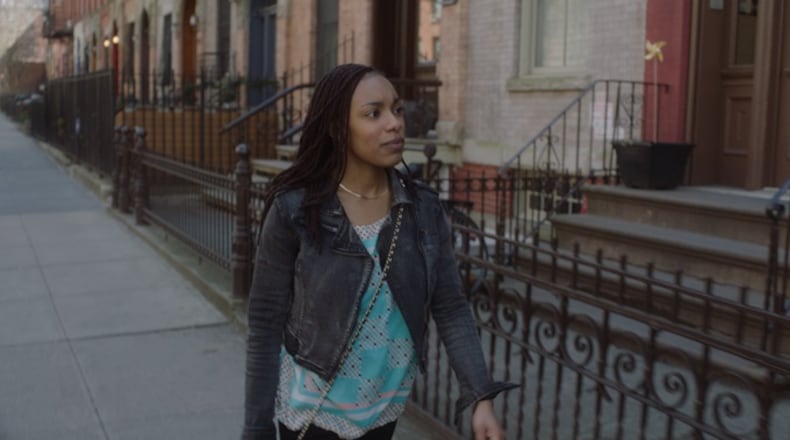While at WSU, Batchelor delivered a dynamic portrayal of vibrant maid Sabina in the 2007 production of ”The Skin of Our Teeth.” She also dazzled as Beneatha Younger in WSU’s 2008 production of “A Raisin in the Sun.” In addition to appearing as Yale University student Terri Scholes in the Human Race Theatre Company’s 2010 local premiere of “The Vertical Hour,” her theatrical credits include performances with Shakespeare Theatre of New Jersey, Baltimore Center Stage, Manhattan Theatre Club, and The Public Theater. Her television credits include “NCIS: New Orleans,” “The Good Fight,” “The Affair” and “Law & Order: SVU.”
A Philadelphia native raised in Atlanta, Batchelor, 32, recently reflected on her acclaimed performance as well as the Gotham Awards, which are among the first significant Oscar precursors leading into the flurry of awards season.
Q: ‘The Surrogate’ and your remarkable performance are among my film favorites of 2020. What was your initial reaction to reading the script?
A: When I read the script I’d never felt so seen by a script before, meaning I’d never seen such a very well-rounded, flawed, young black woman that reminded me of the worst and best parts of myself. It was really exciting. It’s difficult to find that kind of material that speaks to you. Every page I turned I felt I knew her. I didn’t know what it was like to have a tech job, but I knew what it was like to overcommit, to be kinder than necessary, to sacrifice in order to survive, and to be the “only” in certain circles, which is something a lot of (Blacks) have to get by if we go to predominately white institutions or work in the corporate world.
Q: Due to having such extensive screen time, did you consider your task extremely daunting or a fun challenge?
A: It was exciting. I’m used to being a day player on sets, to guest star or appear for a few days and leave. So, it was the first time on film I felt I was able to be a part of a family, which is one of my favorite things about theater. It was very special, a sense of comfort and joy.
Q: As an actress, what allowed you to tap into such a compelling, minimalist vulnerability?
A: I knew the camera was going to catch everything and there was nowhere to hide. I’m grateful for my training and Jeremy’s writing. Being vulnerable in quiet or crying moments was an easy experience because everyone on set was so great.
Q: Did you make peace with Jess’ ultimate decision?
A: Yes. Everything in life has the capacity to change you. I like the fact that in the script there is a choice to be made and afterward you see Jess in a creek, not knowing if she’s lighter or not but knowing something has changed. It’s not the end of the world. She’s moved on. She made a decision and now she will continue to live.
Q: What did you learn the most at Julliard? Are there any misperceptions?
A: I really learned a lot about myself, which was very important to me and very humbling. As for misperceptions, I was told upon auditioning that Julliard was very hoity-toity, stuffy and known to break you down in order to build you up. But I found my experience to be very warm, inviting, vibrant, wild, encouraging, and one-on-one. I also didn’t know Julliard is very community-based.
Q: What lessons did you take away from Wright State?
A: I learned to work through fear. I also learned how to figure out what it was I really wanted and learn how to self-motivate, going beyond whatever was being asked of me at the moment. I’m so grateful for Wright State. They changed my life.
Q: Are there other important lessons you have learned as an actress?
A: Not everyone is going to like you and that’s OK. You don’t need to search for people to like you. You need to search for the work. (The late) Marsha Hanna (of the Human Race Theatre Company) gave me my first lesson in likability. During a scene, she asked why she felt I was talking so high, which started a larger conversation, a deep dive, about what I was really doing on that stage.
Q: Past winners of the Gotham Award for Breakthrough Actor include Timothée Chalamet (“Call Me by Your Name”), Amy Adams (“Junebug”) and Michael B. Jordan (“Fruitvale Station”). How does it feel to be nominated this year?
A: I feel so elated and incredibly grateful. Our film is a small, independent film and to see it recognized with these other incredible films is mind-blowing. To have my name next to people I deeply admire and whose work I have watched with such awe is incredible. It’s also a vote of confidence that makes me feel my work is making some kind of change. People are seeing this film and having conversations, which is what we wanted.
About the Author




